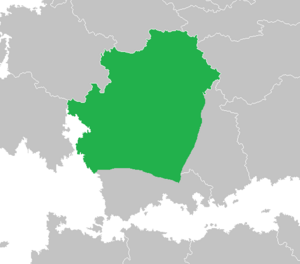Kingdom of Dragovita
Kingdom of Dragovita | |
|---|---|
| 868–1479 | |
 Dragovita at its greatest extent | |
| Capital | Váhom |
| Common languages | Medieval Slavic |
| Demonym(s) | Dragovitan |
| Government | Monarchy |
| King | |
| Historical era | Medieval |
• Established | 868 |
• Dissolved | 1479 |
| Today part of | Svinia |
The Kingdom of Dragovita (sometimes known as the Dragovitan Kingdom or just Dragovita) was the first predominantly Slavic state to emerge in Tyran, forming in west Eracura in 868 CE. The kingdom represented the break away of several slavic tribes from the Acrean Empire between the 8th and 10th Centuries, with the usual date of establishment being 868 CE.
More of a tribal confederation than a unitary kingdom, the Dragovitan capital of Váhom nevertheless became a major center of culture, learning, and commerce. Within fifty years of its foundation the Dragovitan Kingdom formed an official alliance with the Symmerian Empire, forming an official border between the two powers in the former territory of the Bosrei. The relationship between the two countries resulted in a significant exchange of language, knowledge, and trade. The Slavic language of the Dragovitan language very quickly became a lingua franca among merchants and traders within Dragovita and Symmerian subjects, to the point that by the late medeival era the majority of Syaran people outside the Symmerian nobility were speaking a Slavic language rather than the traditional Hellenic speech that had served Syara for millennia.
The Kingdom's close relationship with the Symmerians ultimately ended up contributing to their decline. The Fall of the Symmerian Empire in 1305 resulted in significant loss of trade and tax revenue, weakening the Dragovitan central government. Disputes between tribes over allocations of resources, relations with Acrea, and finally conflict with the rising Shalumite Empire to the west ultimately broke the power of the Dragovitan Kingdom, resulting in it fracturing in 1479, although various Slavic successor states continued to rule their own domains for centuries to come.